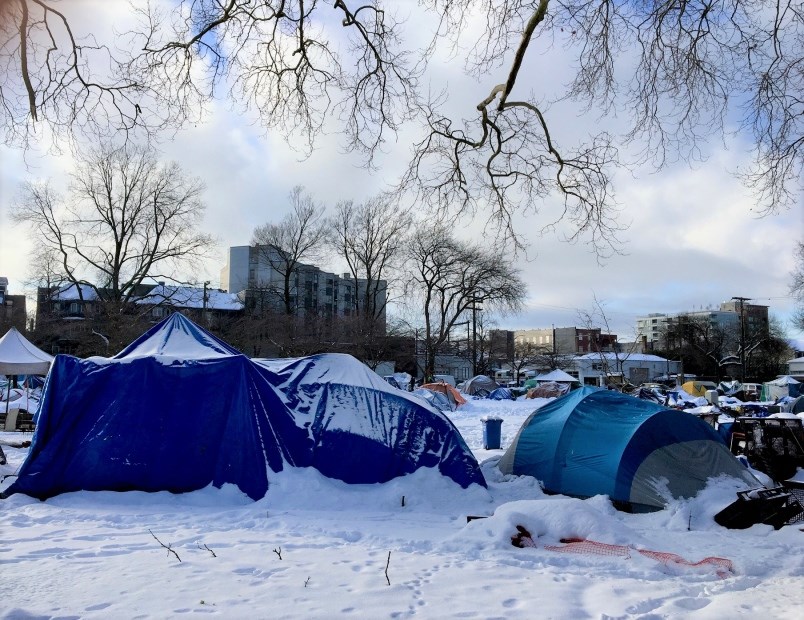A Downtown Eastside non-profit society with a long history of providing housing and services for low-income people with health and substance use challenges has been chosen to help find homes for people living in Oppenheimer Park.
The PHS Community Services Society has signed a contract with B.C. Housing that also requires the non-profit to identify and work with other homeless people living in the broader Downtown Eastside community.
Tanya Fader, director of housing for the PHS, said the society will serve as a coordinator and work with other housing providers to find homes for the estimated 50 to 60 people who remain in Oppenheimer.
“Ultimately, it would be great if we can get everybody housed,” Fader told the Courier Friday.
“Are we going to be able to do that? I don’t know. It also depends on really what people in the park want. We know that housing is a health intervention, and we also know that the longer people stay outside, the more risks there are to their health.”
Fader said she wanted to be clear that the PHS is not managing the park, noting that’s the jurisdiction of the Vancouver Park Board, which worked with the City of Vancouver and B.C. Housing to hire the society.
“We’re there to provide support, connect people with other services, do referrals, help them with paperwork and really try to assess their housing needs, and help people get into shelter, if they’re amenable to that,” she said.
Fader emphasized the work of assessing people and making efforts to find housing will extend to people living and sleeping in the alleys, alcoves, parks and other areas of the Downtown Eastside.
That population size is difficult to estimate, but previous Vancouver homeless counts have shown homelessness is at its greatest in the Downtown Eastside, where many people are living with a mental illness, an addiction, or both.
The hiring of the PHS comes after the city’s Carnegie Outreach Team and B.C. Housing have worked for more than a year to find housing for people in the park. Over the summer 130 people were moved in to housing.
Asked what the PHS will be able to accomplish that the city and B.C. Housing hasn’t, Fader said “I can’t really speak to anything they’re doing or not doing, I just know what we’re doing.”
She said staff working at the park are “really good at building connection, as we do across our services and our housing,” said Fader, noting the society moved more than 30 people from the park into PHS buildings in August 2019.
But at that time, PHS wasn’t in an official role and not funded to provide supports in the park or the rest of the neighbourhood. Now with a funded contract, the cost of which Fader wouldn’t reveal, “more boots” can be on the ground in the park and across the neighbourhood, she said.
Fader said many staff already have links with homeless people associated to other PHS programs and have informally brought food and other services to people in the park and neighbourhood.
The society’s contract with B.C. Housing expires April 1. The park board said in a Jan. 20 news release that its general manager, Malcolm Bromley, maintains the authority to seek an injunction to clear the park “if conditions become favourable for such a court decision.”
“I can clearly state that we are never, and will never be associated with injunctions or the word they used ‘decampment,’” Fader said. “That’s not anything to do with us. We’re just clearly there as a support.”
The PHS manages approximately 20 buildings in Vancouver and Victoria, along with two shelters, which house about 1,500 people. The society also manages drug injection sites, needle exchange depots, detox programs, dental care and other health care services.
Fader said there are no vacancies in any of the PHS buildings to house the homeless people in Oppenheimer. She noted there are other homeless people who don’t want to move into a single-room-occupancy hotel because they have a spouse or want to re-connect with a child.
“Even if they don’t fit in our housing spectrum, it doesn’t mean that we wouldn’t be helping them with all the paperwork and referrals and all that,” she said.
“It’s a collaborative effort, we just happen to be the ones being the point people to provide that on-the-ground support.”
Fader said the PHS will look for housing outside of Vancouver, if that is what homeless people want. She said people could be looking to reconnect with family or friends and the PHS would make efforts to make that connection.
She noted the cost of housing, however, is an issue, particularly in Vancouver.
“Everybody knows as just a regular renter in this city, it’s really difficult to find appropriate housing, and so it’s extra challenging for vulnerable populations,” Fader said.
“We’re dealing with people that have very real and valid concerns and wishes for what they want, and we may or may not be able to meet those for whatever number of people.”
@Howellings
Read more from the Vancouver Courier




